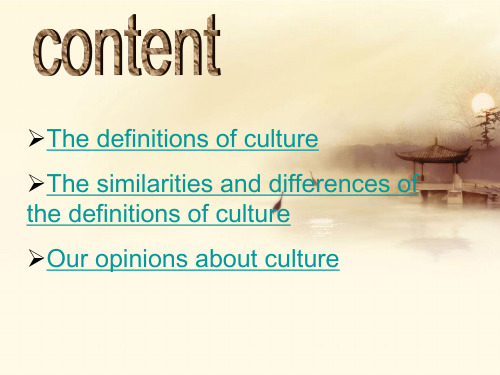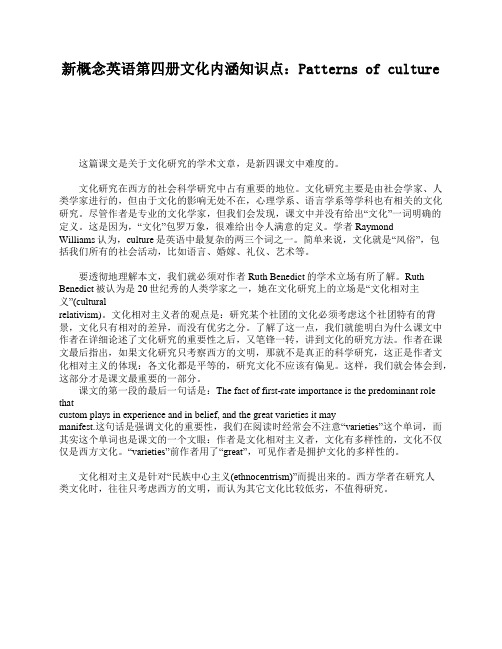第四章TheMeaningsandDimensionsofCulture文化的内涵与维度国际企业与跨文化管理课件
跨文化 Unit 4

[英]Social
公与母 male & female
See
table 4.1 Not all animals or birds have specific names that denote different sex. For these animals or birds, “bull” or “cow” and “cock” or “hen” are frequently used to distinguish sex. Also, using the term “male” and “female”, or sometimes “she” with the generic name is acceptable.
西方人的思维是二元对立的,在他们的
世界里只有黑白,对错。很少有灰色地 带。但是我们中国人的思维通常比较辩 证,这样对,但是那样也可以。所以中 国人在和外国人说话的时候,外国人经 常说的是Don't beat round the bush.
Cultural thought pattern
U.S.:
all the fields except the ones in the natural sciences and applied science.
science: covers a smaller area of learning. Political science, economics, history, and sociology.
不同文化下的人的不同思维方式 See figure 4.1
英国人:直接的、线性的、直线式 闪族人:间接相关与半直接相结合 东方人:循环、迂回论证、螺旋式 罗曼人:固守的迂回 俄罗斯人:直接中又带着隐晦和迂回 西方文化多是推论演绎的论证方式 而东方文化更多倾向于把情感带入归纳式论证
跨文化-the definition of culture

法国作家埃米勒•恩里欧(Emile Henriot,1885-1961) 认为:“文化,就是一个失去所有记忆的人尚具有的气 质(La culture, c'est ce qu'il demeure dans l'homme lorsqu'il a tout oublié)”
19世纪中叶英军指挥官拉格兰勋爵(Lord Raglan)对“文化”的定义是“粗略来说, 文化就是人类具备的而猴子所不具备的那 些特质”(“Culture is roughly anything we do and the monkeys don't)。
Our opinions
Different people have different points of view on culture. Compared to earlier before, the people’s understanding on culture just stays in one aspect of the culture. With the development of the social economy, people have a in-depth understanding of culture. For definitions of culture, generally includes spiritual and material civilization related to economic, political, institutional, ideological and other aspects. To understand the essence of culture, we still have a long way to go.
definition of culture

揭示
(1)文化是人类群体整个的生活方式和生活 过程。主要成分是符号、价值和意义、社会规 范。符号是指能够传递事物信息的一种标志, 它在生活中代表一定的信息或意义。文化的存 在取决于人类创造、使用符号的能力。价值观 是人们评判日常生活中的事物与行为的标准, 决定着社会中人们共有的区分是非的判断力。 社会规范是特定环境下的行动指南,它影响着 人们的心理、思维方式和价值取向、行动。
狭义:指意识形态所创造的精神财富,包括宗 教、信仰、风俗习惯、道德情操、学术思想、 文学艺术、科学技术、各种制度等。
文化是人类生活的反映,活动的记录,历史的积沉, 是人们对生活的需要和要求、理想和愿望,是人们的 高级精神生活。是人们认识自然,思考自己,是人精 神得以承托的框架。 她包含了一定的思想和理论,是人们对伦理、道德和 秩序的认定与遵循,是人们生活生存的方式方法与准 则。思想和理论是文化的核心、灵魂,没有思想和理 论的文化是不存在的。任何一种文化都包含有一种思 想和理论,生存的方式和方法。
5 、社会心理是人们日常的精神状态和思想面 貌,是尚未经过理论加工和艺术升华的流行的 大众心态,诸如人们的要求、愿望、情绪等 6 、社会意识形态是指经过系统加工的社会意 识,往往经由文化专家的理论归纳、逻辑整理、 艺术完善、并以著作、艺术作品等物化形态固 定下来并跨时空传播。
Hale Waihona Puke 7 、根据与社会存在关系的疏密程度,可将社会意识 形态区分为基层意识形态和高层意识形态,前者包括 政治理论、法权观念等,后者包括哲学、文学、艺术、 宗教等。 8 、基层意识形态与社会存在保持着密切联系,是经 济基础的集中体现,但它的产生和发展仍然要经过社 会心理这一中间环节起作用;高层意识形态是更高的 更远离物质经济基础的意识形态,具有较强的独立性, 但它与社会存在之间的中介是社会心理和基层意识形 态。
unit 4

干部
----a small group of people who are specially chosen and trained for a particular purpose. 骨干队伍 ----a member of this kind of group.干部 In EC, many people don’t know what it means. (not a common word) Some other substitutes: official, functionary, administrator, etc. But none of these gets exact same meaning as Chinese word “干部”.
male, female , she also acceptable male leopard, female panda, she wolf
17
副
副主席 vice-chairman 副教授 associate professor 副主任 deputy director 副秘书长 assistant secretary 副州长 lieutenant governor 副国务卿 undersecretary
Unit 4
Verbal Communication
Objectives
Learn the culturally loaded words Learn the cultural reflections on
proverbs Learn taboos Learn the differences in cultural thought patterns
2
CONTENTS
I. Warm-up cases II. Detailed Study:
大学英语跨文化复习资料

⼤学英语跨⽂化复习资料⼤学英语跨⽂化复习资料第⼀章:⽂化(1) Culture (from intercultural communication perspective): is the deposit of knowledge, experience, belief, values, actions, attitudes, hierarchies, religion, notions of time, roles, spatial relations, concepts of the universe, and artifacts acquired by a group of people in the course of generations through individual and group striving.(从跨⽂化交际学⾓度定义⽂化:⽂化是个⼈和群体在种族发展过程中所获得的知识、经验、信仰、价值观、⾏为、态度、阶级、宗教、时间观、⾓⾊、空间观、宇宙观和艺术品的集合。
)(2) Culture Identity:refers to one’s sense of belonging to a particular culture or ethnic group.(⽂化⾝份:认为⾃⼰归属于某⼀⽂化或民族群体的感觉。
)(3) Subculture: refers to a culture that exists within dominant culture, and is often based on economic or social class, ethnicity, race, or geographic region.(亚⽂化:指存在于主流⽂化中的⽂化,其划分通常基于经济地位、社会阶层、民族、种族或地理区域。
)(4) Co-culture: refers to groups or social communities exhibiting communication characteristics, perceptions, values, beliefs, and practices that are significantly different enough to distinguish them from the other groups, communities, and the dominant culture.(共⽂化:指具有独特的交际特征、感知特点、价值观、信仰和⾏为,区别于其他群体、社团以及主流⽂化的群体或社团。
霍夫斯泰德的文化维度理论 ppt课件

秘鲁、法国、智利、西班牙、阿根廷。不确定性回避程度高的国家的人民比较起来更忙碌,
常常坐立不安,喜怒形于色,积极活泼,其文化对法律、规章的需要是以情感为基础的,
这不利于产生一些根本性的革新想法,但却可以培养人们精细、守时的特质,因而善于将
别人的创意付诸实施,使之在现实生活中生效;而回避程度低的文化很有能力对付模模糊
3
2、权利距离(Power Distance)
权利距离表明一个社会能够接受组织或公司的权利在各成员之间不平等分配 的程度。权利距离与等级有关。对这个维度,各个国家由于对权力赋予的意义不 完全相同,所以也存在着很大的差异。有的文化中比较重视权威、地位、资历、 年龄等,而在有的文化中它们的重要性相对较低。比如,美国对权力的看法跟阿 拉伯国家的看法就存在很大的差异,美国不是很看重权力,他们更注重个人能力 的发挥,对权力的追求比阿拉伯国家要逊色不少;阿拉伯国家由于国家体制的关 系,注重权力的约束力,由此,阿拉伯国家的机构,不管是政府部门或者企业vidualism/Collectivism)
个人主义与集体主义(individualism/collectivism)表示个人与群体间 的关联程度。个人主义文化注重个体目标,相反,集体主义文化则更强 调集体目标。个人主义文化中,人们应当自己照顾自己和直系家庭,而 在集体主义文化中,人们期望他们的内群体或集体来照顾他们,作为这 种照顾的交换条件,他们对内群体拥有绝对的忠诚。个人主义没有圈内 (in-group)和圈外(out-group)的明显差别,而集体主义却有明显的圈 内和圈外的差别。
8
表3-2 部分国家和地区男性度指数MDI 一览表
9
在男性文化的社会里,其社会性别角色非常明确,如男人被认为总 是武断的、坚强的、注重物质成就的;而女人被认为总是更谦和、更温 柔和更关心生活质量。在女性文化的社会里,其社会性别角色是重叠的, 如男人与女人都被认为是谦和的、温柔的并都关心生活的质量(Hofstede, 1991)。在男性气质突出的国家中,社会竞争意识强烈,成功的尺度就是 财富功名,社会鼓励、赞赏工作狂,人们崇尚用一决雌雄的方式来解决 组织中的冲突问题,其文化强调公平、竞争,注重工作绩效,信奉的是 “人生是短暂的,应当快马加鞭,多出成果”,对生活的看法则是“活 着是为了工作”;而在女性气质突出的国家中,生活质量的概念更为人 们看重,人们一般乐于采取和解的、谈判的方式去解决组织中的冲突问 题,其文化强调平等、团结,人们认为人生中最重要的不是物质上的占 有,而是心灵的沟通,信奉的是“人生是短暂的,应当慢慢地、细细地 品尝”,对生活的看法则是“工作是为了生活”。
新概念英语第四册文化内涵知识点:Patterns of culture

新概念英语第四册文化内涵知识点:Patterns of culture这篇课文是关于文化研究的学术文章,是新四课文中难度的。
文化研究在西方的社会科学研究中占有重要的地位。
文化研究主要是由社会学家、人类学家进行的,但由于文化的影响无处不在,心理学系、语言学系等学科也有相关的文化研究。
尽管作者是专业的文化学家,但我们会发现,课文中并没有给出“文化”一词明确的定义。
这是因为,“文化”包罗万象,很难给出令人满意的定义。
学者RaymondWilliams认为,culture是英语中最复杂的两三个词之一。
简单来说,文化就是“风俗”,包括我们所有的社会活动,比如语言、婚嫁、礼仪、艺术等。
要透彻地理解本文,我们就必须对作者Ruth Benedict的学术立场有所了解。
Ruth Benedict被认为是20世纪秀的人类学家之一,她在文化研究上的立场是“文化相对主义”(culturalrelativism)。
文化相对主义者的观点是:研究某个社团的文化必须考虑这个社团特有的背景,文化只有相对的差异,而没有优劣之分。
了解了这一点,我们就能明白为什么课文中作者在详细论述了文化研究的重要性之后,又笔锋一转,讲到文化的研究方法。
作者在课文最后指出,如果文化研究只考察西方的文明,那就不是真正的科学研究,这正是作者文化相对主义的体现:各文化都是平等的,研究文化不应该有偏见。
这样,我们就会体会到,这部分才是课文最重要的一部分。
课文的第一段的最后一句话是:The fact of first-rate importance is the predominant role thatcustom plays in experience and in belief, and the great varieties it maymanifest.这句话是强调文化的重要性,我们在阅读时经常会不注意“varieties”这个单词,而其实这个单词也是课文的一个文眼:作者是文化相对主义者,文化有多样性的,文化不仅仅是西方文化。
understandingculturaldifferences文化维度理论课件

1 Individualism & Collectivism
2 The Power Distance Dimension
Cultural Dimensions
3 The Uncertainty Avoidance Dimension
4 The Masculinity & Femininity Dimension
Individualism & Collectivism
Answer the following question:
• Which country can be classified into the culture of individualism?
• USA, Australia, Britain, Netherland, Canada, Germany, Chinese Hong Kong, Chinese Taiwan, etc.
Individualism & Collectivism
Individualism • found in most northern
and western regions of Europe and in North America.
Collectivism • a cultural pattern
The Masculinity and Femininity Dimension
• Femininity pertains to “societies in which social gender roles overlap (i.e. both men and women are supposed to be modest, tender, and concerned with the quality of life)”.
- 1、下载文档前请自行甄别文档内容的完整性,平台不提供额外的编辑、内容补充、找答案等附加服务。
- 2、"仅部分预览"的文档,不可在线预览部分如存在完整性等问题,可反馈申请退款(可完整预览的文档不适用该条件!)。
- 3、如文档侵犯您的权益,请联系客服反馈,我们会尽快为您处理(人工客服工作时间:9:00-18:30)。
How Culture Affects Managerial Approactability vs. Innovation 稳定与创新
– The culture of some countries encourages stability and resistance to change. 一些国家更注重稳定,反对变革 – The culture of others puts high value on innovation and change. 在另一些国家更注重创新和变革
– In some societies, people identify very strongly with their organization or employer. 在一些社会中,雇员可以根据其所属的组织或雇主加 以区分 – In others, people identify with their occupational group, such as engineer or mechanic. 在另一些社会中,雇员主要依据其职业类别来区分, 如工程师或机械式
4-11
How Culture Affects Managerial Approaches 文化是怎样影响国际管理的
• Short-term vs. Long-term Horizons 短期视野与长期视野
– Some culture focus most heavily on short-term horizons, such as short-range goals of profit and efficiency. 一些文化更强调短期视野,如利润和效率的短期目标 – Others are more interested in long-range goals, such as market share and technologic developments. 另一些国家则更注重长期目标,如市场份额和技术发 展
4-3
Characteristics of Culture 文化的特征
• • • • • • • • • • • • Learned 文化是学习形成的 Shared 文化是可以分享的 Trans-generational 文化是代代相传的 Symbolic 文化具有象征性 Patterned 文化是模式化的 Adaptive 文化是适应性的
4-4
Priorities of Cultural Values
4-5
How Culture Affects Managerial Approaches 文化对国际管理的影响
• Centralized vs. Decentralized Decision Making: • 集中决策与分散决策
– In some societies, top managers make all important organizational decisions. – 在一些社会中所有重要的决策都由高层领导人决 定;, – In others, these decisions are diffused throughout the enterprise, and middle- and lower-level managers actively participate in, and make, key decisions. 在其他社会中,这些决策被分散在整个企业,中层和 基层管理者能够积极参与到决策活动中,并能够做 出一些重要的决定。
chapter four
The Meanings and Dimensions of Culture 文化的内涵与维度
McGraw-Hill/Irwin
Copyright © 2009 by The McGraw-Hill Companies, Inc. All Rights Reserved.
Chapter Objectives 学习目标
4-13
A Model of Culture 文化模型
4-14
Business Customs in South Africa 南非的商业习俗
• Arrange meeting before discussing business over phone. 在讨论业务前通过电话安排一次会议 • Make appointments as far in advance as possible. 会面应该预订的越早越好 • Maintain eye contact, shake hands, provide business card 保持眼神交流,握手并向每一位递送名片 • Maintain a win-win situation 维持一种双赢的战略 • Keep presentations short 保持介绍简短
4-16
Values in Culture
4-17
Values in Culture
4-18
Values in Culture
4-19
Value Similarities and Differences Across Cultures 不同文化之间的价值观异同
1.Strong relationship between level of managerial success and personal values 管理者获得成功的层次与其个人价值之间存在明显的相关关系. 2.Value patterns predict managerial success and can be used in selection/placement decisions 价值观体系预示着管理者的成功态度,可以作为挑选和配置管理者的决策依 据。 3.Country differences in relationship between values and success; however, findings across U.S., Japan, Australia, India are similar 尽管在管理者价值观和成功的关系上,不同文化的国家之间存在差异,但是, 美国、日本、澳大利亚、印度四个国家的研究结果十分相似 4.Values of more successful managers favor pragmatic, dynamic, achievementoriented and active role in interaction with others 成功的管理者趋于实务、活力、成就导向和在与人交往的过程中扮演主动积 极的角色。 5.Values of less successful managers tend toward static and passive values; relatively passive roles in interacting with others 成功程度低的管理者趋向于平稳和被动的价值观,在环境中扮演相对被动的 角色。
4-6
How Culture Affects Managerial Approaches
• Safety vs. Risk: • 安全与风险
– In some societies, organizational decision makers are risk averse and have great difficulty with conditions of uncertainty. – 在一些社会中,组织决策这就厌恶风险,难以应付 不确定的环境; – In others, risk taking is encouraged, and decision making under uncertainty is common. – 在其他一些社会中,就鼓励冒险,在不确定的环境 下决策也十分常见。
4-10
How Culture Affects Managerial Approaches 文化是怎样影响国际管理的
• Cooperation vs. Competition 合作与竞争
– Some societies encourage cooperation between their people. 一些社会鼓励人与人之间的合作 – Others encourage competition between their people. 另一些社会则更鼓励竞争
4-15
Values in Culture 文化中的价值观
• Values价值观
– Learned from culture in which individual is reared 来自于人们所扎根的文化 – Differences in cultural values may result in varying management practices 不同的价值观导致了不同的管理实践 – Basic convictions that people have about 人们所持的基本信念 • Right and wrong 正确与错误 • Good and bad 好与坏 • Important and unimportant 重要与不重要
4-7
How Culture Affects Managerial Approaches
• Individual vs. Group Rewards: • 个人回报与团队回报
– In some countries, personnel who do outstanding work are given individual rewards in the form of bonuses and commissions. – 在一些国家,奖金、佣金等形式的回报主要给予那 些做出杰出贡献的个人; – In others, cultural norms require group rewards, and individual rewards are frowned upon. – 而在其他国家,文化的规范则要求团队的回报,不 赞成个人的回报。
